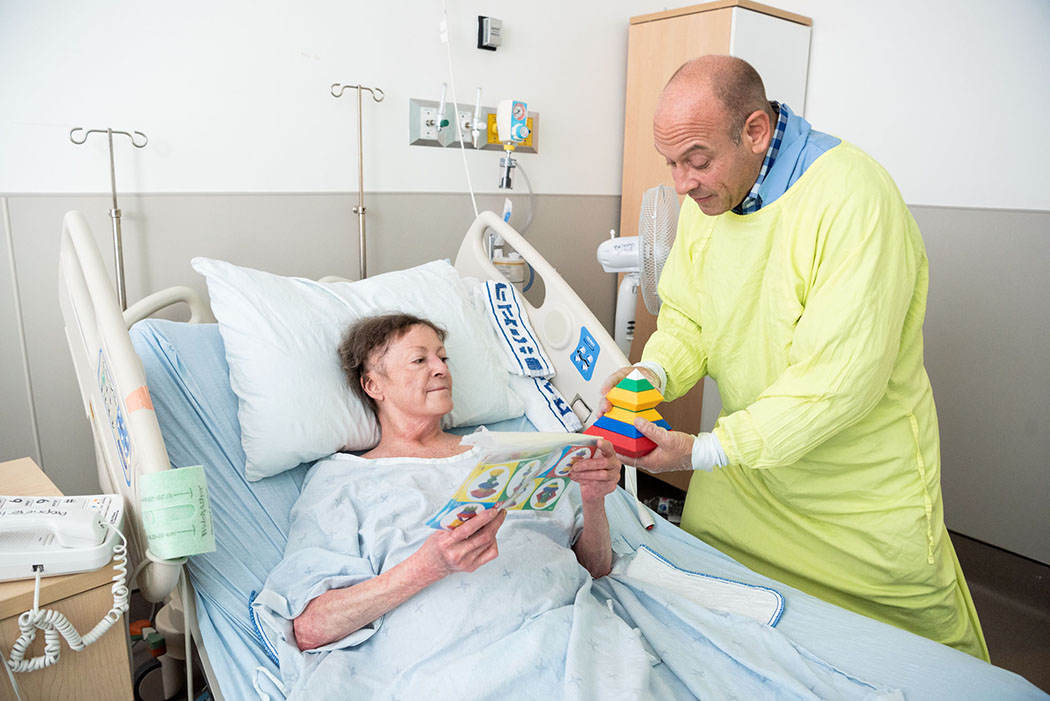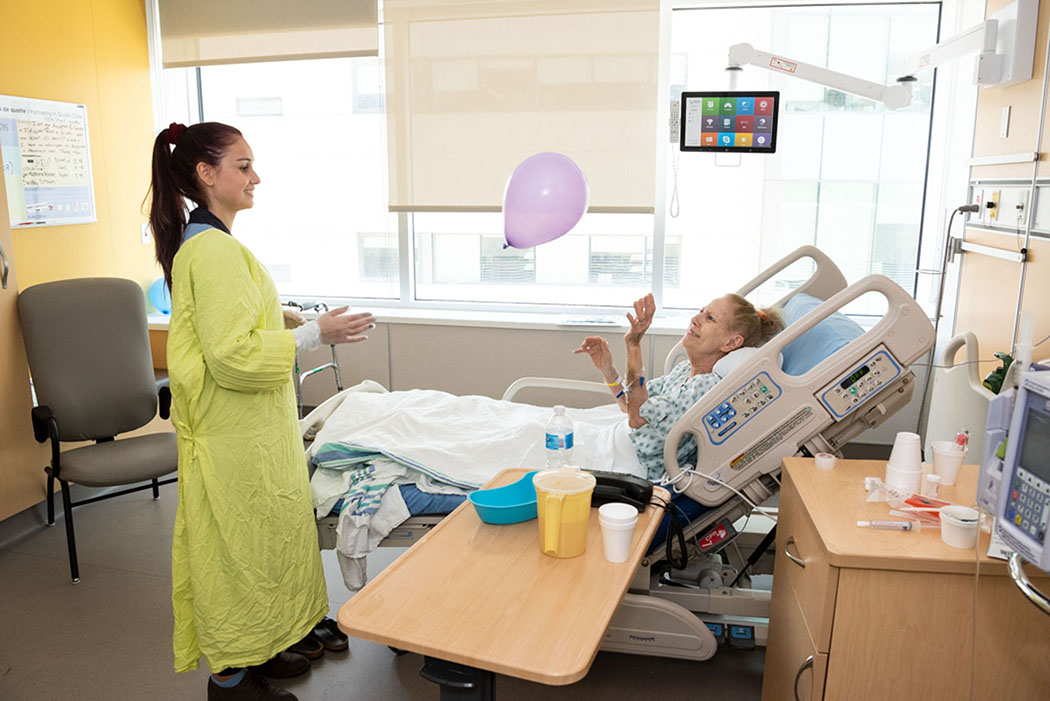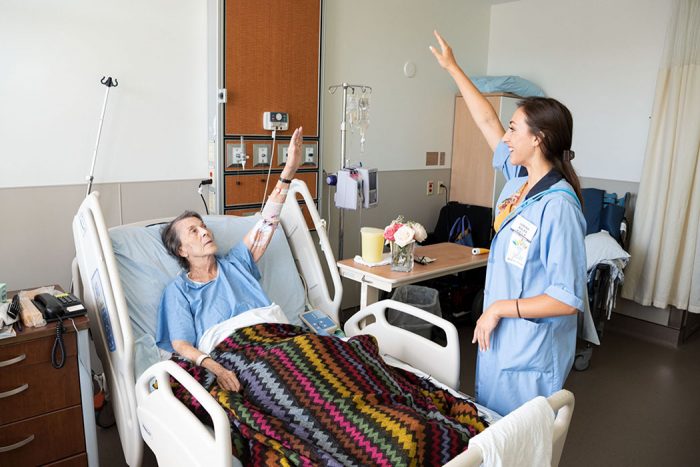Source: JGH
A JGH program, in which intensively trained volunteers work to enhance the care of hospitalized seniors, has been recognized for excellence by the healthcare division of Desjardins.
The Hospital Elder Life Program (HELP) has received Desjardins’ SRS Award (Stars du réseau de la santé – Stars of the Healthcare Network) in the Caring category and will be featured in the upcoming inaugural edition of the company’s Health Review.

Maxine Lithwick, Coordinator of Social Services and Professional Practice in the Rehabilitation and Multidisciplinary Directorate of CIUSSS West-Central Montreal, calls the award “a wonderful way of acknowledging how hard our volunteers and staff have worked to improve the hospital stay of elderly patients.”
Isabelle Lamontagne, an elder life specialist who coordinates the JGH HELP program, agrees and adds that the program provides an invaluable service by reducing the incidence of delirium in older patients and helping them to maintain their functional autonomy.
“When a person approaching the age of 80 is admitted to a hospital for any diagnosis, three areas are always at risk for deterioration—mental functioning, nutritional status and mobility,” says Dr. Ruby Friedman, JGH Chief of Geriatrics.
“Consequently, delirium, dehydration, malnutrition and immobility can develop within days of admission. This results in poor quality of life, a prolonged hospital stay and a possible transfer to a long-term care facility.”
Having originated in the United States, the HELP program has been shown to improve the quality of life for elderly hospitalized patients, contribute to a reduction in their length of stay and help prevent placement in a long-term care facility.
“All of the qualified volunteers always brought smiles, patience and obvious empathy to my dad. It is so wonderful to have a program like HELP to bring some sunshine to a patient’s day.”
Introduced in 2016 as a pilot project at the JGH, HELP began on a single floor as a collaborative initiative among Multidisciplinary Services, Nursing and Geriatrics staff, with financial support from the JGH Foundation and the JGH Auxiliary. It has since become an ongoing program and has been launched on four other floors, with plans for expansion throughout the hospital.
What HELP’s volunteers do is engage patients in a variety of activities, including daily orientation, cognitive stimulation, exercise, assistance with meals, and promoting relaxation before sleep. Though cheerful and upbeat, “they’re not like the usual visiting volunteers,” Ms. Lithwick notes.
Ms. Lamontagne explains that patients are often vulnerable and have multiple medical problems, as well as other special needs. For this reason, the volunteers—most of whom are in their early 20s and are interested in a career in health care—are rigourously prepared, receiving eight hours of classroom instruction and 16 hours of practical training. Each person must also commit to working for at least 104 hours (four hours a week for 26 weeks).
Training is provided in such areas as infection control, how to speak with and listen closely to patients, and how to pick up on any signs or symptoms that something is not right.
The volunteers are fully aware of what patients can and cannot do in terms of exercise or physical activity, and they know where to find any relevant information about restrictions or special requirements for individual patients. In addition, Ms. Lamontagne monitors each volunteer’s performance and provides feedback.

The results, says Ms. Lithwick, have been overwhelmingly positive. As an example, she cites a letter of praise from Tony De Santis, whose 99-year-old father received almost daily visits from the HELP volunteers.
“All of the qualified volunteers always brought smiles, patience and obvious empathy that they offered to my dad,” Mr. De Santis wrote. “It is so wonderful to have a program like HELP to bring some sunshine to a patient’s day.”
Great satisfaction is also felt by volunteers like Lorina Bolea, who is moving to the United States this summer to pursue her education in medicine and osteopathy. “You always gave me such incredible opportunities to improve myself and contribute to the patients’ well-being,” she said in an email. “I’m very grateful for this enriching and rewarding experience.”
The next step in HELP’s evolution is a formal agreement with McGill University for 93 first-year students in occupational therapy and physiotherapy to come to the JGH as part of a course—not just a stage—in the university’s health program. Classroom instruction begins this fall, followed in January by practical training.
The long-range goal, says Ms. Lithwick, is to work with the CIUSSS’s Academic Affairs Directorate to develop additional agreements to offer training to students from other schools, in such fields as kinesiology and psycho-education.
Equally important, she says, is that HELP is making the study of geriatrics more inviting and compelling for individuals who might not otherwise have considered it. “Working with older people has never been a sexy subject, but the reality is that, because of the demographics of our aging population, those are the patients who will be seen by anybody who’s now going into the healthcare field.
“Some of our volunteers have said they felt privileged to get to know the patients and listen to their life stories. Now these young people are becoming ambassadors. I believe that HELP will be instrumental in changing negative attitudes, and this will continue to improve the quality of care that patients receive.”
October 17 2019

